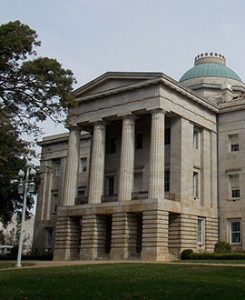News
.Back to listing
Wed, Nov 30
Two Duke PhD Students Win Grant to Study Science & Technology Policy Fellowship Feasibility in NC
Two Duke University PhD candidates have been awarded a $25,000 grant to study the feasibility of establishing a North Carolina Science and Technology Policy Fellowship Program.
 The California Council on Science and Technology (CCST) in partnership with the Gordon and Betty Moore Foundation and Simons Foundation is funding multiple grants to support planning processes for creating immersive science and technology policy fellowship programs in state legislature.
The California Council on Science and Technology (CCST) in partnership with the Gordon and Betty Moore Foundation and Simons Foundation is funding multiple grants to support planning processes for creating immersive science and technology policy fellowship programs in state legislature.
Few state legislators have backgrounds in science, engineering, or technology, yet they are routinely called on to make decisions on issues with complicated scientific and technological components. The Fellowship Program would provide the state legislature with non-partisan science PhDs to assist them in grappling with the complex issues of science underlying many legislative initiatives.
Andrew George and Dan Keeley, researchers in the Duke Biology PhD program, won their bid for North Carolina with support from Science & Society, the Sanford School for Public Policy, the Duke Government Affairs Office, and the North Carolina Sea Grant Program.
“We are going to have to work hard to engage public and private universities, business, and non-profits as well as legislators and members of the executive branch throughout the entire process to ensure that we are creating a fellowship that best serves the needs of the fellows and state policy,” says George. “A primary challenge of implementation is the difference in structure of the legislatures.”
Both researchers became active in science policy after a government shutdown froze federal spending on research. During meetings on the hill they were pleasantly surprised by how engaged and interested many of the staffers were in hearing about their research.
The model California fellowship has impacted over 800 bills, hearings, and actions since it began placing PhD-level scientists in the state’s legislature for one-year appointments. Of those fellows placed, 50% were hired by the state legislature or other state agencies at the end of their fellowship.
The CCST seeks to replicate the model in other states. Their vision for the future is a network of state-based science advising programs that better inform state legislatures on science and technology relevant policy issues.
Andrew and Dan will be interested in a variety of perspectives from students, postdocs, and early career faculty regarding what they would want from a fellowship like this. Contact Andrew George, ang16@duke.edu or Dan Keeley, daniel.keeley@duke.edu for more information.
At Science & Society we are training the next generation of leaders to be better equipped in this rapidly expanding environment. Our Master in Bioethics & Science Policy prepares students to identify, analyze, and propose solutions to myriad complex issues at the intersection of science, technology, ethics, and policy.
In addition, Science & Society’s recently launched SciPol program serves as a comprehensive online resource for scientists, policy makers, the public, students, and other stakeholders on developments in science and technology policy.

